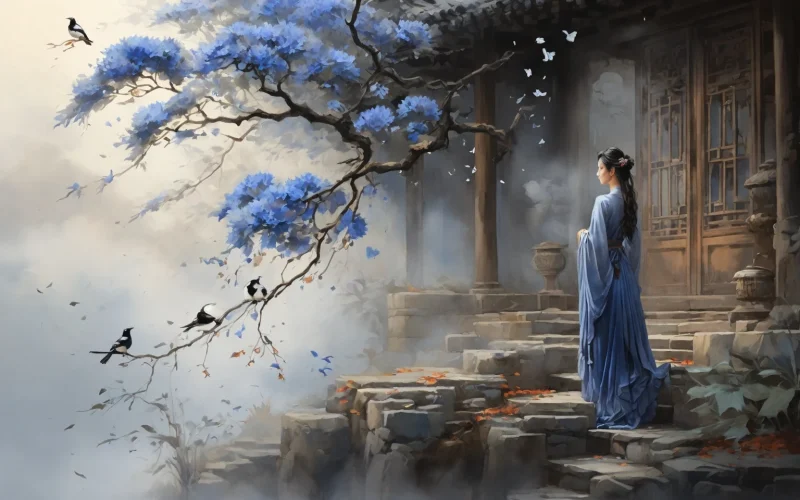On bamboo mat I long for you without a break,
Coming from afar, you don't keep the date you make.
From now on, I won't care for any lovely night;
In vain on the west tower may the moon shine bright.
Original Poem:
「写情」
李益
水纹珍簟思悠悠,千里佳期一夕休。
从此无心爱良夜,任他明月下西楼。
Interpretation:
This poem depicts the pain of heartbreak through a seven-character quatrain. The poet expresses emotions stemming from disappointment, helplessness, and even despair. The poem employs the backdrop of beautiful scenery, virtual techniques, and subtle psychological portrayal, creating layers of meaning and profound imagery in expressing sorrow.
First Couplet:“水纹珍簟思悠悠,千里佳期一夕休。”
(The water ripples on the precious bamboo mat as my thoughts wander; a thousand-mile promise, broken in a single evening.)
These lines combine delicate imagery with inner monologue to convey the emptiness and disappointment the poet feels due to an unfulfilled appointment. The detail of "water ripples on the bamboo mat" evokes the poet’s restless thoughts and unending longing, while “a thousand-mile promise, broken in a single evening” emphasizes the suddenness of the disappointment.
Second Couplet:“从此无心爱良夜,任他明月下西楼。”
(From now on, I have no heart to enjoy the fine night, let the moon rise in the west tower—it matters not to me.)
These lines express the poet’s resolve to no longer appreciate beautiful nights due to heartbreak. The words “no heart to love” and “let it” highlight the poet’s resignation and negative emotional response, hinting at a total abandonment of hope for the future and an emotional closure.
Writing Characteristics:
- Nature as a Contrast to Sorrow: The poet contrasts the beauty of natural imagery, such as "water ripples on the bamboo mat" and "moon rising in the west tower," with the pain of heartbreak. While these images typically evoke positive feelings, in the poet's heart, they only reflect emptiness and sorrow. This contrast emphasizes the inner solitude and hopelessness.
- Virtual Technique to Intensify the Tone: In the last two lines, the poet uses a virtual situation to express the protagonist’s decisive emotions and irreversible pain. “From now on, no heart to love the fine night” and “let the moon rise” not only convey the poet's deep despair but also demonstrate an inner rebelliousness and pessimistic attitude. The use of hypothetical language deepens and authenticates these emotions.
Overall Appreciation:
"A Date" contrasts beautiful scenery with the sorrow of heartbreak, adding emotional depth and layers to the poem. The first two lines use detailed imagery to show the poet’s deep suffering from disappointment, while the latter lines use virtual expressions to reflect the poet’s resolute mindset. The poem's language is simple but full of intense emotional fluctuations, showcasing the poet's despair about love and helplessness toward the past.
Poem translator:
Xu Yuan-chong (许渊冲)
About the poet:

Li Yi (李益), 748-829 AD, a native of Wuwei in Gansu Province, was one of the “Ten Scholarly Men of the Dali Dynasty”, and is best known for his works on the border and the Plateau, especially for his seven-character stanzas. His poems had a harmonious rhythm and were sung by musicians at that time.












